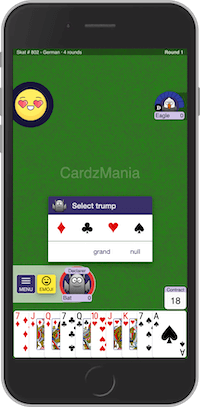Overview
Skat is a trick taking game where players try to play the highest ranked card in a trick to get a set amount of points. Skat is the national game of Germany and is played by 3 players.
Ranking of Cards
The card ranking changes with the type of skat game played. Below are the card rankings for the three types of skat: Suit, Grand, and Null
Suit: (High-Trump) Jacks in CSHD order, Ace, 10, King through 7 (Low-Trump)
(High-Non Trump) Ace, 10, King through 7 (Low-Non Trump)
Grand: (High-Trump) Jacks in CSHD order (Low-Trump)
(High-Non Trump) Ace, 10, King through 7 (Low-Non Trump)
Null: (High-Non Trump) Ace, King through 7 (Low-Non Trump)
Presets
- German: Standard edition as outlined in this guide
- Augenramsch: Standard edition without the bidding and only the Ramsch variations enabled
Play Multiplayer Skat Online
The Deck and the Deal
Skat is played with a German 32 card deck, or Aces through 7s in all suits. After shuffling the deck, the dealer passes out the cards in the following way: Three cards to each player, two cards set aside for the skat pile, four cards to each player, and three cards to each player. At the end of the deal, every player should have ten cards. Two cards are leftover in the deck and may be picked up by the declarer.
How to Play
Auction
The player left of the dealer is called the forehand. Going clockwise, the other two players are called the middlehand and rearhand. In skat, there are two stages in the auctioning process. The first stage is between the middlehand and forehand. Starting with the middlehand, players bid on how many points they can win in the round. The player who has the highest bid before the other player passes proceeds to the next stage. The next stage is a round of bidding between the previous winner and the rearhand. The player with the highest bid becomes the declarer.
The declarer then has the choice to pick up the skat pile. If they do so, they can exchange any of their cards for the two skat cards.
Contracts
The declarer decides on the game's contract, or the game's trumps. The declarer can decide between three contract types: Suits, Grand, or Null.
Suits: The declarer decides which of the four suits is trump for the game.
Grand: The declarer decides that only Jacks are trump for the game.
Null: The declarer decides that there are no trumps for the game and doesn't intend to win any trick.
If the declarer does not pick up the skat pile and chooese either a suits or grand contract, they can additionally decide to announce Schnieder, Schwarz, or Open
Schnieder: The declarer intends to win 90 points or more.
Schwarz: The declarer intends to win all of the tricks.
Open: The declarer flips over their cards so that the other players can see them.
Play
Forehand leads the first trick. Players must follow the lead suit if they can. The player with the highest card wins the trick and leads the next trick. This continues until all cards are played.
Scoring
The scoring of Skat is derived from the multiplication of two numbers, the base value and the multiplier. If the declarer wins the round (gets more than 60 out of 120 points in tricks), then the product of the two numbers is added to their score. If the declarer loses the round but meets their bid, then twice the product of the two numbers is subtracted from their score.
Base Value
The number for the base value depends on the contract type.
Diamonds are worth 9
Hearts are worth 10
Spades are worth 11
Clubs are worth 12
Grand are worth 24
A Simple Null is worth 23
A Null Hand (Skat is not picked up by declarer) is worth 35
A Null Ouvert (Declarer plays with open cards) is worth 46
A Null Overt Hand (Skat is not picked up and cards are open) is worth 59
Multiplier
All applicable multipliers are worth 1 point and are added up for the final multiplier.
Winning
To win a round the declarer must win 61 or more trick points. The declarer wins trick points for the kinds of cards they win in a trick.
Aces are worth 11 points
10s are worth 10 points
Kings are worth 4 points
Queens are worth 3 points
Jacks are worth 2 points
Matadors
A Matador is the Jack of Clubs and a sequence of top trumps. Matadors account for the player's original hand and the Skat pile.
A Matador is a sequence of cards containing a Jack. Each matador in a declarer's hand plus the skat pile adds 1 to the final multiplier. The following sequences are matadors in Skat:
Jack of Clubs, Hearts, and Diamonds, Ace, 10, Queen, and 9 of Hearts.
Jack of Clubs, Spades, Hearts, and Diamonds, Ace, 10, King of Hearts.
Jack of Spades and Hearts, Ace, King, Queen and 7 of Hearts.
Jack of Diamonds, Ace, 10, King, Queen, 7 of Hearts.
Hand
This multiplier is applicable if the declarer doesn't look at the skat pile.
Schnieder
This multiplier is applicable if the declarer takes 90 or more card points in the game. An additional 1 point is added to the multiplier if the declarer announces Schnieder before the trick taking begins.
Schwarz
This multiplier is applicable if the declarer takes all of the tricks in the game. An additional 1 point is added to the multiplier if the declarer announces Schwarz before the trick taking begins.
Open
This multiplier is applicable if the declarer allows the other players to see his hand throughout the round.
Winning
A player wins when they achieve an agreed upon number of points.
Variations
CardzMania supports several customizable rules and options so you can play Skat exactly how you like or how you grew up playing with your friends and family. In addition to the classic way of playing, we often have new creative options for you to try to spice up the game if you are interested in trying different spins for fun.
Rounds
Players determine a set amount of rounds (also known as hands or deals) that the game will go to (instead of the points selection above).
Timer
Players only have a set amount of time to make their turn after which a turn is automatically played for them and the game proceeds: Fast is 7 seconds, Standard is 15 seconds, Slow is 30 seconds, and Very Slow is 60 seconds. Players can also choose to disable the timer, but that is only for private tables.
Grand Game
Players can decide the base value of a grand game. The options are 20 or 24.
Hide trick points
Players can choose to hide accumulated trick points during the trick play. This is how the game is played in real life where you have to keep the count in your head.
Ramsch
Players play a ramsch hand/round when everyone passes (to encourage everyone to bid). Otherwise, the hand is just thrown in and cards are redealt for the next round; No one gains or loses any points. You can choose fixed points (10) or trick points to be penalized for the loser.
Ramsch Skat
When playing ramsch hand/round, this option determines who gets the skat. When disabled, this option means no one gets the skat. Last trick means the person who won the last trick gets the skat (and its points). Loser means whoever lost the round (had the most points) gets the skat (and its points) to further worsen their loss.
Jungfrau
This is when one person wins no tricks at all (virgin). You can choose for the loser to get 5 more penalty points or double their loss.
Double Jungfrau
This is when two players win no tricks at all (virgin) i.e. one person wins all the tricks. You can choose for the loser to double the jungfrau loss selected above or if it's considered to be shooting the moon i.e. the loser doesn't lose any points but the other two opponents lose all the points.
Trick Basics
Trick Taking games center around having the highest ranked card in a draw. Typically, players of trick taking games sit in a circle, sometimes in teams and sometimes playing solo, and are dealt a hand of cards. Given the specific game's card ranking (and trump - special suit that beats other suits), players draw a card from their hand in hopes that it outranks the other cards played. The player who outranks the others wins the trick for that round and gameplay is repeated until the cards are exhausted. Typically the player or team with the most tricks wins the game.
In a trick, each player plays a single card. One player is selected to start, then play proceeds clockwise around the table. If possible, players must play a card which is the same suit as the first card played - this is called 'following suit'. If a player cannot follow suit, then they may play any card in their hand. Based on the cards played, one player is declared the winner of the trick, usually for playing the highest value card of the trump suit, or of the suit of the card which started the trick.
After all cards have been dealt, normal trick taking commences. Remember all cards of the suit declared as trump (trump cards) beats any other suit. Whichever team wins seven tricks out of thirteen wins the round, winning all thirteen tricks is referred to as court. If the dealers team achieves this feat, its called a goon court. In single sir, winning the first seven consecutive tricks constitutes a court.
After cards dealt, depending on the trump, you have to figure out your strategy for the game whether to play trump first or not. In single sir / single sar winning the first seven tricks constitutes as a court or a goon court, so the strategy is very different than double sir / double sar. Whichever team (dealers team or trump callers team) wins seven tricks wins the deal and the opposing team becomes the dealer. In double sir, you have to win two consecutive tricks, so the strategy is totally different as you need to keep another high card to win the pile. Note that the second and the second last trick cannot be won, so you have to be extra careful about that too. This game is played in many variations so you have to be extra careful about the rules.
Based on the cards played, one player is declared the winner of the trick, usually for playing the highest value card of the trump suit, or of the suit of the card which started the trick.
Hand
The cards that a player is dealt forms their hand. Each round, a player selects one of the cards in their hand and plays them into the pile. In most trick taking games, all players are dealt the same number of cards and the hand is hidden from the other players, but in some games, like 500, a player can reveal their hand for bonus points.
Pile
The pile is the spot where players place their chosen card for the round. The player with the highest ranked card receives all of the cards in the pile and sets them to the side. In most trick taking games, the individual cards in the pile have a specific point value that is given to the winner.
Dealer
The dealer is chosen at random and passes out the deck of cards to form each player's hand. In most games, the dealer position rotates to the left once the deck needs to be re-shuffled and re-dealt.
Trump
Arguably the most important part of any trick taking game, the trump suit is the highest ranked suit in the game. Every game has its own method of selecting trump. Some games leave the selection up to the winner of the bid while some games make the suit of the lead card the trump suit.
Order
The ranking of the cards is dependent on the game. Ace is usually considered the highest in trick games, but some games from Europe, like Klaverjassen, have the Jack of trump the highest card.
Auction/Bidding
Most trick taking games contain an auctioning/bidding phase at the beginning of gameplay. During this time, players take turns bidding how many tricks they expect to win in the game. The player with the highest bid leads the first trick and decides the trump suit in most games. Often times, if the winner of the bid, sometimes called the declarer, fails to win the amount of tricks they bidded, they receive a lot of penalty points
Lead Card
The Lead card is the first card in the trick. In most trick taking games, subsequent players need to play the suit of the lead card if they can.
Card Game Basics
A deck of cards consists of 52 cards, with 4 distinctive subgroups. Each of these subgroups is recognised by a symbol and are referred to as suits. They consist of Clubs, Spades, Hearts and Diamonds. Each suit contains 13 cards which, generally, are considered in this order, Ace (A), 2, 3, 4, 5, 6, 7, 8, 9, 10, Jacks (J), Queen (Q) and King (K). Some games include the two Jokers found in a standard deck but most games don't.
Feedback
Would like to discuss new features or variations for Skat? Need a custom rule? Have a question? Got a suggestion? Don't see a game you want to play? Please contact us by
email, facebook or twitter - we really value your feedback and love hearing from all of you!
This site uses cookies. By continuing to browse the site you are agreeing to our use of cookies.




